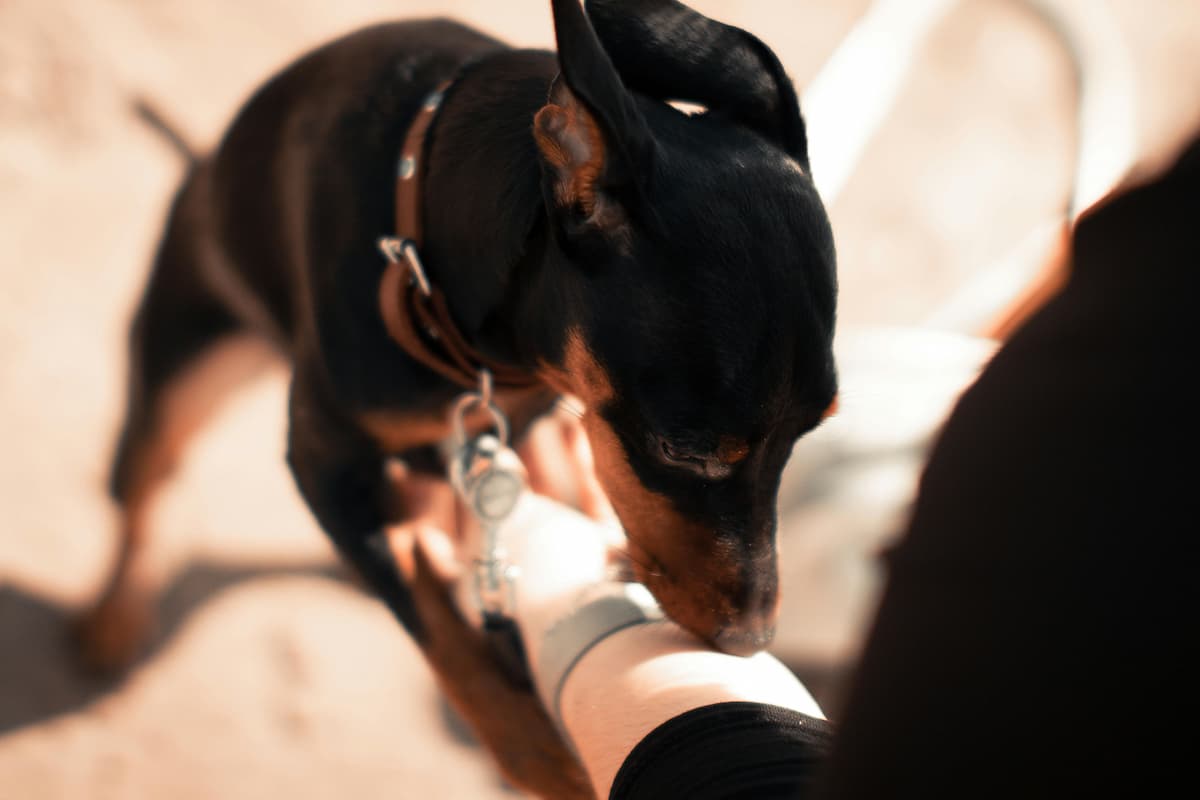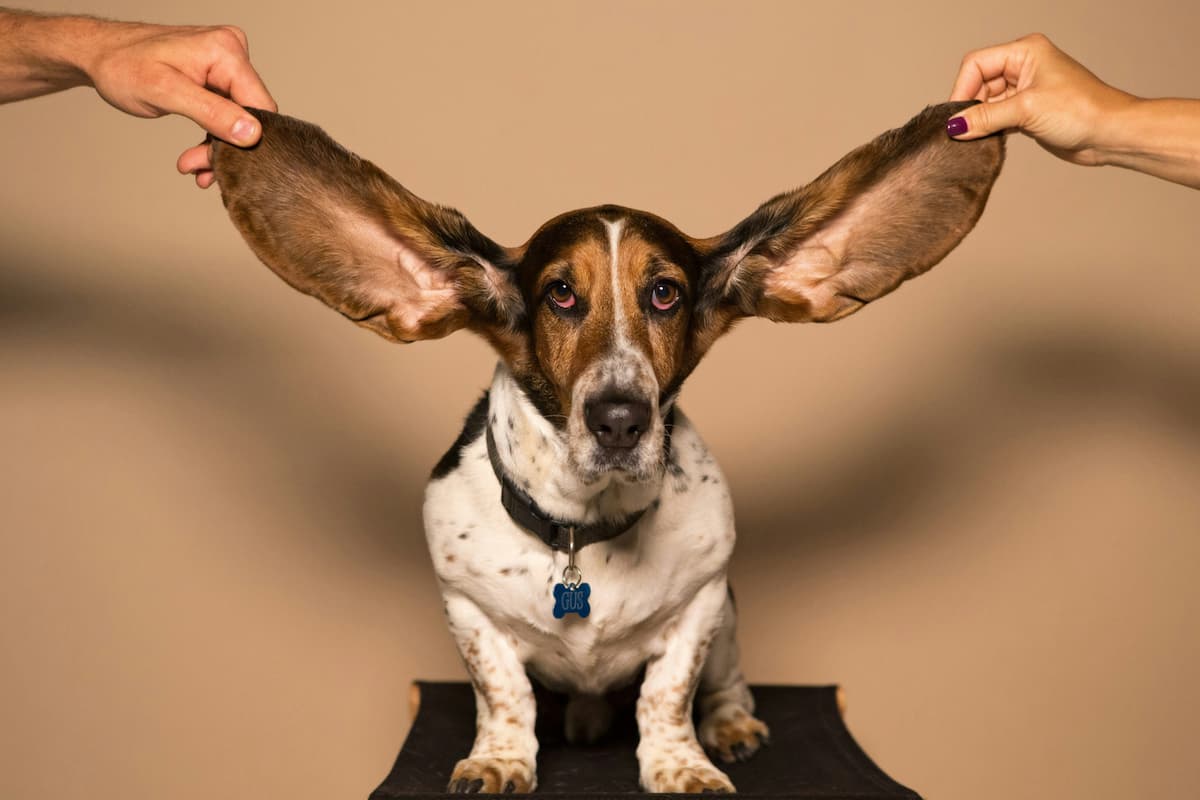Have you ever experienced the delightful sensation of a dog’s wet nose gently prodding your ear?
Have you wondered why our furry friends find so much fascination in sniffing our ears?
It’s a question that has intrigued many for years.
This article will answer the question: Why do dogs sniff my ears?
Why are My Dog’s Sniffs Directed at My Ears?
Have you ever wondered why your furry friend insists on sniffing your ears?
It may seem like an odd behavior, but there’s actually a fascinating link between canine behavior and scent detection.
Dogs have an incredible sense of smell, with over 300 million scent receptors in their noses, making them the ultimate scent detectives.
This heightened sense of smell allows them to gather information about the world around them, including our ears!
When a dog sniffs your ears, they are actually gathering important information about you.
Our ears emit a variety of scents, including natural oils, sweat, and even earwax.
While this may not be the most pleasant thought, these scents provide dogs with valuable insights into our health, emotions, and even our identity.
They can detect changes in our body chemistry, such as fluctuations in stress hormones or signs of illness.
Furthermore, dogs have a special affinity for earwax.
While it may sound gross to us, earwax contains a multitude of scents that can tell a dog a lot about an individual.
Just like a fingerprint, the scent of our earwax is unique to each person.
Dogs can easily pick up on these scents and may even use them to distinguish between different people.
Additionally, dogs are incredibly social creatures, and scent plays a crucial role in their way of communicating.
Just like how we humans use body language and facial expressions to express our emotions, dogs rely heavily on their sense of smell to understand their surroundings.
Sniffing your ears could be their way of gathering information about you, such as your emotional state or recent activities.
They may also be seeking reassurance or trying to establish a closer bond with you.
So, next time your dog investigates your ears with a sniff, remember that they are simply trying to connect with you on a deeper level.
Lastly, it’s important to note that dogs have a keen sense of curiosity.
They explore the world around them with their noses, and our ears happen to be an interesting body part for them to investigate.
Their curiosity drives them to explore every nook and cranny of their surroundings, including the fascinating nooks and crannies of our ears.
How to Interpret Your Dog’s Ear-sniffing Behavior
It’s important to note that not all ear-sniffing behavior is simply curiosity.
Sometimes, dogs may sniff our ears as a sign of affection or to establish their dominance.
If your dog gently sniffs your ears while wagging their tail and displaying relaxed body language, it’s likely an affectionate gesture.
However, if they accompany the ear-sniffing with other dominance-related behaviors like raised hackles, stiff body posture, or even growling, it’s important to seek professional advice to address any potential behavioral issues.
Tips to Keep Your Dog’s Ear-sniffing Habits in Check
While ear-sniffing can be endearing, it’s essential to keep this habit in check to ensure both your comfort and your pup’s safety.
Here are a few tips and tricks to help you manage your dog’s ear-sniffing tendencies:
Teach the “Leave it” command: Training your dog to respond to the “Leave it” command can come in handy when their sniffing becomes intrusive.
By teaching them to back off when you give this command, you can establish boundaries and teach them that ear-sniffing is not always acceptable.
Redirect their attention: If you notice your dog becoming fixated on your ears, redirect their attention to a more appropriate activity or toy.
Provide them with an alternative focus that engages their senses and keeps them entertained.
Practice positive reinforcement: Whenever your dog shows restraint and refrains from excessive ear-sniffing, reward them with praise or a small treat.
Positive reinforcement can help reinforce desired behaviors and discourage excessive sniffing.
Remember, every dog is unique, and what works for one may not work for another.
Understanding the reasons behind your dog’s ear-sniffing habits is the first step towards managing and redirecting this behavior.
With some patience and consistency, you can keep your dog’s curiosity in check while still nurturing the beautiful bond you share.
FAQ
Q: Why are dogs so interested in our ears specifically?
A: Believe it or not, dogs have an incredibly acute sense of smell, even better than ours!
Their sense of smell is like a superpower to them, and they use it to explore and understand the world around them.
Since the scent glands in our ears produce unique odors, it’s like an exciting opportunity for dogs to gather information about us and their surroundings.
Q: Is there any specific reason why dogs choose ears over other body parts?
A: Dogs typically choose to sniff our ears because they’re full of interesting and distinct smells.
Our ears produce natural oils, sweat, and even different types of bacteria, all contributing to a distinctive scent.
Plus, there are plenty of little nooks and crannies there that dogs find intriguing and appealing to investigate.
So, don’t take it personally; it’s just your ears being a smelly wonderland for them!
Q: Can I stop my dog from doing this if I find it annoying or uncomfortable?
A: Of course, you can!
While it’s important to remember that sniffing ears is a natural behavior for dogs, you can gently train them to respect your personal space.
One effective approach is to calmly and consistently redirect their attention when they start sniffing your ears.
Offer them an alternative, like a toy or a treat, to distract them from their ear-sniffing mission.
Q: Should I be concerned if my dog is obsessively sniffing my ears?
A: If your dog’s behavior becomes obsessive or persistent, it may indicate an underlying issue.
Sometimes, dogs can develop compulsive behaviors due to stress, anxiety, or even certain medical conditions.
If you’re worried or notice any excessive signs of obsession, it’s best to consult with a veterinarian or a professional dog trainer who can provide guidance on how to address the problem.
Q: Is ear-sniffing a behavior found in all dogs?
A: Yes, ear-sniffing is generally a common behavior among dogs.
Different breeds may show varying levels of interest, but it’s a typical canine behavior.
Keep in mind that some individual dogs might be more curious about ears than others, while some might not show much interest at all.
Just like humans, dogs have their preferences and quirks!
Q: Can I prevent my dog from sniffing other people’s ears?
A: It’s always a good idea to ask for consent from others before allowing your dog to interact with them.
Not all people may feel comfortable with a dog getting up close and personal with their ears.
Being respectful of other people’s boundaries and preferences is essential in maintaining positive and harmonious interactions.
So, the next time your furry friend dives headfirst into your ears with great enthusiasm, remember that it’s their way of exploring, gathering information, and merely being dogs!
Closing Thoughts
And there you have it, the fascinating explanation as to why our furry friends can’t resist giving our ears a good sniff!
Who would have thought that their incredible sense of smell could reveal so much about our health and emotions?
It’s truly remarkable how dogs have evolved to become our loyal companions, attuned to our every move and constantly trying to make sense of our world.
So next time you catch your furry buddy sniffing around your ears, remember that they’re not just being nosy – they’re simply trying to decipher the incredible symphony of scents that swirls around you.
Embrace their curiosity, and cherish those moments of connection that only a dog’s nose can provide.
After all, in the wonderful world of dogs, a sniff is worth a thousand words!












